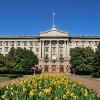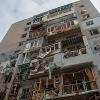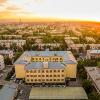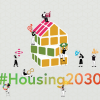Press Releases
Displaying Results 1 - 14 of 14
A UNECE study on the sharing economy and its effects on housing markets shows how the massive emergence of temporary rental accommodation through platforms such as AirBnB has changed living habits in cities, and highlights a range of policy and regulatory approaches that can be taken to balance
Ihor Terekhov, Mayor of Kharkiv, and Architect Norman Foster presented today details about the new Kharkiv reconstruction master plan approach. It will be based on five pilot projects, chosen in coordination with local residents, and will be developed based on 14 guiding principles discussed with
During the past two weeks, over 10,000 delegates have attended the second part of the Conference of Parties (COP-15) of the UN Convention on Biological Diversity (CBD) in Montreal, Canada, as they seek to agree on the post-2020 Global Biodiversity Framework. Unsurprisingly, forests are at the
Countries have taken a step to translate rising commitment for sustainable urban development into concrete changes to the fabric of our cities with the adoption of a UN-backed Declaration.
Today, governments attending the 83rd session of the UNECE Committee on Urban Development, Housing and
UNECE has mobilised international architects to help the city of Mykolaiv, Ukraine’s ninth largest city, develop a forward-looking, people-centred master plan for building back better. This work will be led by One Works, a global design and architecture company, in collaboration with Ukrainian
The war has already caused the destruction of infrastructure in many urban areas of Ukraine and will require enormous efforts by the government and international partners to reconstruct following the cessation of hostilities.
In April 2022, the Ministry for Communities and Territories Development
From the climate crisis to inequalities, urban areas play an increasingly central role in tackling key sustainable development challenges. Strengthening the connections between city-level actors and facilitating their engagement in international policy debates is therefore vital to scale up
Increasingly frequent and intense extreme weather events due to climate change that can lead to industrial accidents and unchecked urban and regional development could together be a recipe for disaster, warn the UN and the governments of Albania, Bosnia and Herzegovina, Montenegro, North Macedonia
Cities’ growing role in the implementation of the 2030 Agenda has led to increased global attention on localizing SDGs. The preparation of Voluntary Local Reviews (VLRs) enables the review of SDG implementation at a local level. VLRs complement Voluntary National Reviews developed at the country
Humanity is facing not one but three intertwined crises: the COVID-19 pandemic, climate change, and a lack of adequate and affordable housing. Each of these three emergencies has the potential to compound the multidimensional impacts of the others in health, social cohesion, environmental integrity
Approximately 50 million people in the UNECE region live in inadequate housing conditions. In the 21st century, the governance, land and finance systems that influence the delivery and consumption of housing have been beset by numerous crises. Emanating from climate change, unguided investment
Globally, 690 million people suffer from hunger and three billion cannot afford healthy, nutritious food. Despite this, the Food and Agriculture Organization of the United Nations (FAO) estimates that one-third of all food fit for consumption is either lost during the production or shipping process
The COVID-19 pandemic has had a multi-dimensional effect on the UNECE region, causing the worst economic contraction in decades. Cities and urban areas, with their high population density and interconnectivity, were particularly vulnerable and encountered major disruptions. The pandemic impacted
Cities are growing fast. Half the world’s population already lives in urban areas and another 2.5 billion are expected to be living in cities by 2050. In 2015, the international community set the goal of making cities “inclusive, safe, resilient and sustainable” by 2030 (Sustainable Development















